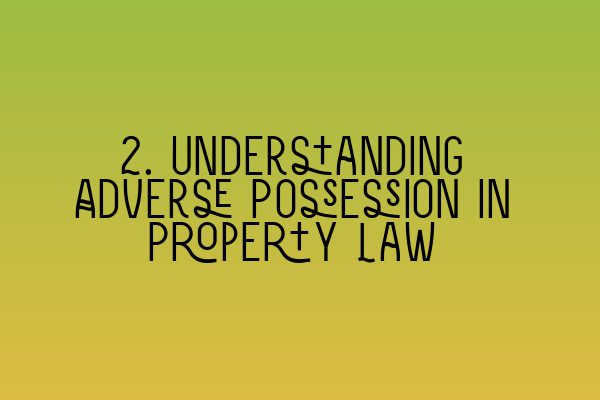Understanding Adverse Possession in Property Law
When it comes to property law, one concept that often arises is adverse possession. Adverse possession refers to a situation where a person who is not the legal owner of a property becomes its owner by taking possession and occupying it for a certain period of time, usually a minimum of 12 years. This legal doctrine has both practical and legal implications, as it can completely change the ownership of a property. In this article, we will dive deep into adverse possession, exploring its requirements, legal implications, and more.
1. The Requirements of Adverse Possession
For adverse possession to be established, certain requirements must be met. These requirements may vary slightly depending on the jurisdiction, but the core principles remain the same. Generally, the following conditions must be fulfilled:
- Actual possession: The claimant must physically possess the property and occupy it as if they were the true owner. Merely having a legal interest in the property, such as a lease agreement, is not enough.
- Exclusive possession: The claimant must possess the property exclusively, meaning they are the sole occupant and have control over it without interference from the true owner or other third parties.
- Open and notorious possession: The claimant’s possession must be open and obvious to the true owner and the public. This means acting as if they were the rightful owner, such as maintaining the property, paying property taxes, and publicly declaring their ownership.
- Hostile possession: The term “hostile” does not necessarily imply animosity. It simply means that the claimant’s possession is without the permission or consent of the true owner.
- Continuous possession: The possession must be continuous throughout the required period, usually 12 years. However, some jurisdictions may have different timeframes.
Meeting these requirements can be complex and may require extensive legal knowledge. Consulting a qualified property law solicitor is crucial when dealing with adverse possession cases to ensure compliance and avoid potential legal pitfalls.
2. Legal Implications of Adverse Possession
Adverse possession not only changes the ownership of a property but also has significant legal implications. The most significant consequence is that it extinguishes the true owner’s title to the property, transferring it to the adverse possessor. This means that the true owner loses their rights and control over the property.
Moreover, adverse possession may impose certain obligations and responsibilities on the adverse possessor. For example, the adverse possessor may be required to pay property taxes, maintain the property, and comply with any other legal obligations associated with property ownership. These obligations can vary depending on the jurisdiction and the specific circumstances of the case.
It’s important to note that adverse possession is not an automatic process and cannot be claimed arbitrarily. The adverse possessor must initiate legal proceedings to establish their claim and prove that they have met all the necessary requirements. This involves filing a claim in court and presenting evidence to support their case.
3. Seeking Legal Advice for Adverse Possession Cases
Given the complexity of adverse possession cases and the potential legal implications involved, it is highly recommended to seek professional legal advice. A qualified solicitor specializing in property law can provide expert guidance and representation throughout the process. They can assist in gathering the necessary evidence, preparing legal documents, and navigating the intricacies of the legal system.
If you are preparing for the SQE exams, comprehensive preparation courses are available at SQE Property Law & Land Law. These courses cover all the essential topics related to property law, including adverse possession. Enhance your knowledge and skills to excel in the SQE 1 and SQE 2 exams.
For more information on SQE 1 practice exams, SQE 2 preparation courses, and SQE exam dates, check out the following articles:
SQE 1 Practice Mocks FLK1 FLK2
Remember, understanding adverse possession is crucial for anyone involved in property law. Whether you are a solicitor, aspiring lawyer, or simply a property owner, being well-versed in this legal concept can protect your rights and interests. Stay informed, seek professional advice, and ensure compliance with the relevant legislation to effectively navigate the intricate landscape of property law.
